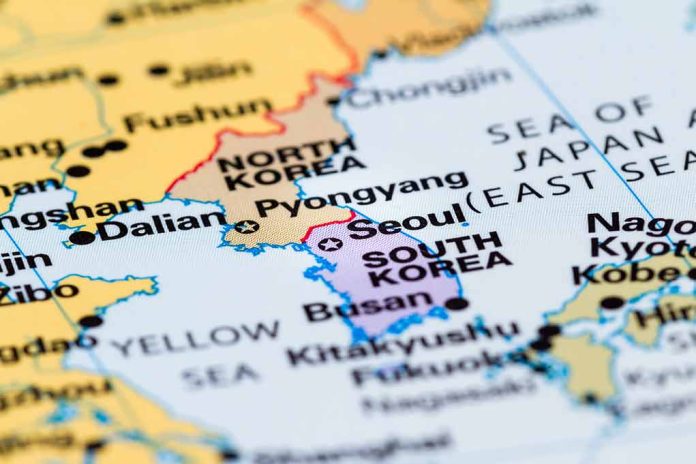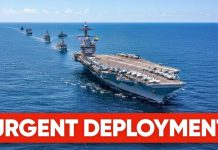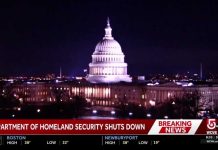
Kim Jong Un ordered a monument for North Korean soldiers killed while fighting for Russia in Ukraine, officially confirming the deployment of 14,000 troops in the most significant military alliance since the Korean War.
Key Takeaways
- North Korea has officially confirmed sending 14,000 troops to support Russia in Ukraine, including special operations units, marking its first major armed conflict since the Korean War.
- Russia and North Korea signed a mutual defense treaty in June 2024 that requires military assistance if either nation is attacked, formalizing their military alliance.
- North Korea has supplied Russia with millions of artillery shells, ballistic missiles, and multiple-launch rocket systems, constituting the most significant direct aid to Russia from any country in this conflict.
- Ukrainian forces have captured North Korean soldiers on the battlefield, with South Korea’s intelligence confirming the first North Korean prisoner of war.
- Putin has praised North Korean troops as “heroes” who fought “shoulder to shoulder” with Russian forces, claiming they helped liberate the Kursk border region.
North Korea Officially Confirms Military Deployment
In a stark admission that confirms months of Western intelligence reports, North Korea has publicly acknowledged deploying troops to Russia to fight against Ukraine. The unprecedented confirmation came as North Korean leader Kim Jong Un ordered a monument built to honor North Korean soldiers killed while fighting alongside Russian forces. This deployment represents North Korea’s first major armed conflict participation since the Korean War ended in 1953 and signals a significant escalation in international involvement in the Ukraine conflict.
Intelligence sources estimate that approximately 14,000 North Korean troops have been sent to Russia, including special operations forces. The deployment follows a mutual defense treaty signed between the two nations in June 2024, which requires military assistance if either country comes under attack. This formal alliance has transformed what was previously a covert relationship into a public military partnership that directly challenges Western support for Ukraine.
North Korea and Russia acknowledged for the first time the deployment of North Korean troops in the Ukraine conflict, a sign of the deepening military alliance and mutual defense pact between Pyongyang and Moscow https://t.co/xzNffWNuW8
— The Wall Street Journal (@WSJ) April 28, 2025
Russia Claims Victory in Kursk with North Korean Support
Russian President Vladimir Putin has publicly expressed gratitude for North Korea’s military assistance, specifically citing their role in operations to reclaim the Kursk border region from Ukrainian forces. While Ukraine denies losing control of the entire region, Russia has claimed complete victory in Kursk and credited North Korean troops with playing a crucial role in these operations. This propaganda victory allows both Russia and North Korea to portray their alliance as successful against Western-backed Ukrainian forces.
“We will always honor the Korean heroes who gave their lives for Russia, for our common freedom, on par with their Russian brothers in arms,” Mr. Putin said.
Russian statements suggest that approximately 4,000 North Korean troops have been killed or wounded in the fighting, indicating the significant scale of their involvement. Putin has emphasized the sacrifice of these forces, declaring that Russian people will “never forget the heroism” of North Korean special forces. The public acknowledgment of these casualties represents a turning point in how both nations are approaching their military cooperation, moving from secrecy to open declarations of mutual support.
Significant Military Aid Beyond Troop Deployment
Beyond sending personnel, North Korea has provided Russia with substantial military hardware that has been deployed against Ukrainian forces. These supplies include millions of artillery shells, ballistic missiles, long-range artillery systems, and multiple-launch rocket systems. Ukrainian President Volodymyr Zelenskyy has accused North Korea of direct involvement in attacks on Ukrainian soil, including a missile strike on Kyiv that reportedly contained American components, raising questions about sanctions enforcement.
“The Russian people will never forget the heroism of the DPRK special forces. We will always honor the heroes who gave their lives for Russia, for our common freedom, fighting side by side with their Russian brothers in arms,” Putin said.
This military support constitutes the most significant direct aid provided to Russia by any country since the conflict began, effectively circumventing Western sanctions and isolation attempts. In exchange, analysts suggest North Korea is seeking advanced military technologies and security guarantees from Russia. This transactional relationship benefits both nations while undermining international efforts to contain North Korea’s weapons programs and Russia’s military capabilities in Ukraine.
International Reactions and Strategic Implications
South Korea has condemned North Korea’s troop deployment as “an act against humanity” and urged their immediate withdrawal. President Trump has expressed skepticism about peace negotiations between Russia and Ukraine producing results anytime soon, particularly as Russia claims battlefield successes with North Korean assistance. The expanded North Korea-Russia military alliance represents a clear challenge to American interests and signals the formation of a more cohesive anti-Western bloc that includes China, Iran, and other nations opposed to U.S. global leadership.
“[It is] an act against humanity,” Koo Byoungsam, spokesperson for South Korea’s Unification Ministry, said.
The deepening relationship between Russia and North Korea raises serious concerns about technology transfers that could accelerate North Korea’s nuclear and missile programs. With Ukrainian forces having captured North Korean soldiers on the battlefield, including one prisoner of war confirmed by South Korean intelligence who later died from injuries, the conflict has now directly entangled multiple nations in a proxy war with global implications. Kim Jong Un’s recent meetings with Russian officials and his strong public support for Russia’s actions in Ukraine suggest this alliance will continue strengthening despite international condemnation.




